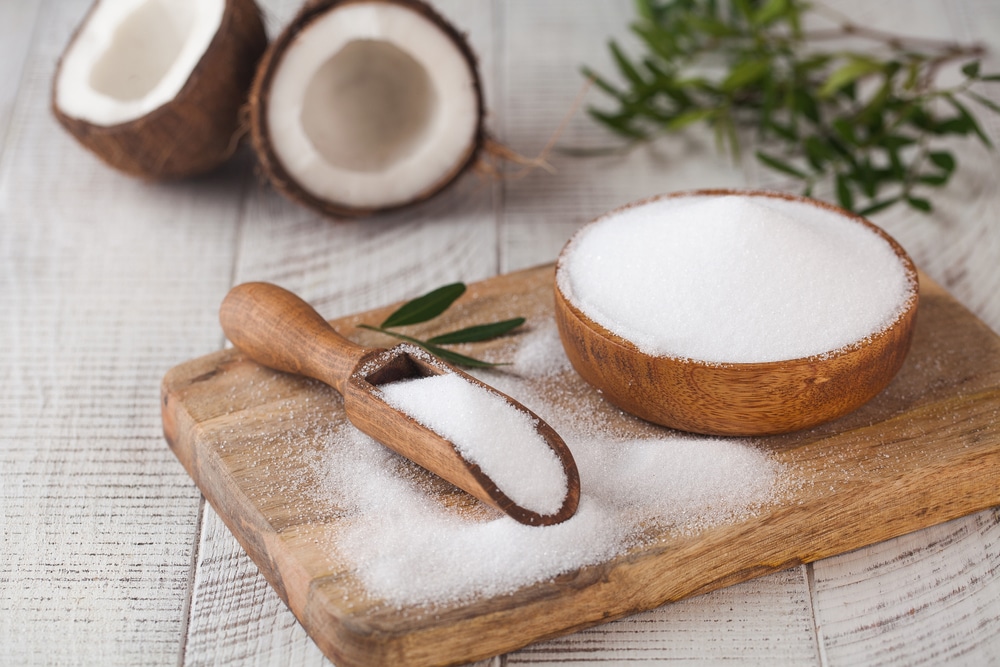Coconut sugar and stevia are among the two most popular sugar substitutes used in most diet plans. They have been praised by most people using them, especially weight watchers who want to shed extra pounds. However, this has not come without controversies. Some people believe that coconut sugar is healthier and better compared to stevia. It might explain the unending coconut sugar vs. stevia tug of war. So, which is better off between these two sweeteners? To answer this, let us evaluate each of these sugar substitutes’ nutritional profile, health benefits, and risks.
Organic Coconut Sugar Vs. Stevia: What Is The Difference?
To best determine the difference between these two sweeteners, first, you must understand the definition of each. Take a look:
Organic Coconut Sugar
It refers to sugar that comes from the coconut palm tree. Some people may refer to this sugar as coconut palm sugar or coconut flower nectar if it is in liquid form (3). To make the organic coconut sugar, you must first harvest the coconut palm sap. It entails cutting the flower-bud stem and then draining the nectar.
If you want to make coconut flower nectar, you boil the sap with some water. However, if you want coconut sugar, you let the nectar dry and crystallize (3). After it is dry, you break it down into small granules, which most of us recognize as sugar molecules.
Stevia
Stevia is a natural sweetener that is obtained from the bushy stevia plant. It is about 100 to 300 times sweeter compared to table sugar (8). Nevertheless, it has low calories per serving, which explains why it is classified under the zero-calorie sweeteners (10).
Read More: Stevia And Belly Fat: Why All Sweeteners Can Not Be Trusted
Carbs In Coconut Sugar Vs. Stevia
Coconut palm sugar tends to retain most of the nutrients found in the coconut palm. It does contain calcium, iron, potassium, and zinc, albeit in very small amounts (2). In addition to these nutrients, the sugar substitute also contains carbohydrates. According to WebMD, one teaspoon of this sweetener will contain 5g of carbs, 18 calories, and 5g of sugar (2). On the other hand, stevia is believed to have zero to low calories and carbs, if any (10).
Coconut Sugar Vs. Stevia: Which Is Best For Weight Loss?
There have been numerous debates about the effects of each of these sweeteners when it comes to weight loss. Some people believe organic coconut sugar is healthier. To help you make an informed decision on this, let us look into the effect of each of these sweeteners on weight.
Coconut Sugar
Some people believe that this sweetener is the perfect sugar substitute. They think this sweetener is their weight loss miracle because it is recommended in multiple weight loss recipes. But is this the case?
Unfortunately, Medical News Today acknowledges that coconut sugar is not your weight loss sweetener miracle (3). Like any other food product, the site reveals that coconut palm sugar also contains calories and other carbohydrates.
We all know that weight loss requires you to maintain a caloric deficit. To help maintain this deficit, most weight watchers should lower their carb intake. Sadly, coconut sugar has high calories and carbs content, despite them being fewer when compared to table sugar (3).
100g of coconut sugar has 375 calories and 100g of carbs (3). While this seems safe compared to table sugar, it does not take away the fact that it has high calories and carb content.
Remember that you are trying to consume fewer calories than your body is burning to help you shed pounds. Taking several servings of this sweetener may compromise your weight loss efforts and results.
Stevia
The naturally sourced sugar substitute is believed to have zero calories (9). It is an excellent addition to a weight loss diet plan because it has low energy and carbohydrate contents. These are two risk factors for increased body fat. Given that it minimizes these risk factors, experts acknowledge that you can use it to lose weight and prevent obesity (9).
Intense sweat sessions, working weight loss tips, lip-smacking recipes come in one package with the BetterMe app. And all of it is at your fingertips, start transforming your life now!
Liquid Stevia Vs. Coconut Sugar: Which Is Healthier?
The primary comparison between coconut palm sugar vs. stevia lies in the benefits. Each of these sweeteners is praised for offering various health benefits. But which one brings more health gains to the table? Below is a comparison between the health benefits and risks of these two popular sweeteners.
Coconut Palm Sugar Advantages
Consuming palm sugar can help you reap any of the following health benefits:
-
Better Digestion
Coconut palm sugar contains a dietary fiber known as inulin. Inulin has been linked to better gut bacteria control, which promotes better digestion and improves mineral absorption (7).
-
Improved Nervous System Functioning
Palm sugar has higher potassium levels (by weight) than other food products such as bananas and green vegetables (7). The mineral helps maintain an excellent nervous system as it regulates muscle contractions and the heartbeat (7).
-
Blood Sugar Regulation
Coconut sugar has a lower glycemic index and less glucose compared to honey or table sugar. These lower levels may help stabilize blood sugar levels, reducing chances of blood sugar spikes.
Disadvantages Of Coconut Palm Sugar Consumption
Despite the impressive health benefits profile, consuming coconut palm sugar may also result in several health problems. These include:
-
Deteriorated Oral Health
Consuming too much sugar, including coconut palm sugar, increases your risk of dental problems and mouth infections (1). The high fermentable carbs content in these sugars increases the risks of these problems.
-
Increased Stress
WebMD reveals that individuals who consume a high-sugar diet have increased risks of anxiety, stress, and cognitive impairment (7).
Read More: Stress Belly: Taking A Quick Dive Into The Science Behind It
Stevia Advantages
If used as an alternative to table sugar, stevia may result in several health benefits. Some of these include:
-
Diabetes Management
Numerous studies have concluded that stevia consumption has minimal to no effects on insulin levels, blood pressure, blood glucose, and body weight (10). It means that people with diabetes can consume stevia, but only after getting their doctor’s go-ahead.
-
Reduced Risk Of Pancreatic Cancer
Stevia contains various compounds and sterols, including kaempferol. Studies have found that kaempferol inhibits the growth of pancreatic cancer cells (6).
-
Reduced Blood Pressure
Studies reveal that stevia has cardiotonic actions, which normalize blood pressure and regulate the heartbeat. Therefore, stevia consumption may potentially lower blood pressure (5).
Stevia Disadvantages
Some potential health dangers may arise from stevia consumption. According to Medical News Today, these include (4):
-
Gastrointestinal Symptoms
Several stevia products have added sugar alcohols, which may cause unpleasant symptoms in people sensitive to such products. Despite hypersensitivity to sugar alcohol being rare, symptoms such as nausea, vomiting, bloating, cramping, and indigestion may be observed (4).
Whether you’re looking to simply pep up your fitness routine, jazz up your diet with mouth-watering low-calorie recipes or want to get your act together and significantly drop that number on your scale – BetterMe app has got you covered! Improve your body and revamp your life with us!
-
Kidney Damage
Stevia is a diuretic, meaning it increases the speed at which the body expels electrolytes and water from the body in urine. Long-term consumption of stevia may damage the kidney. However, more recent studies have discovered that this sweetener can avoid kidney damage
-
Hypoglycemia
Heavy or long-term consumption of stevia may cause low blood sugar or hypoglycemia in individuals with extremely low blood sugar levels.
-
Low Blood Pressure
Prolonged use of stevia may also lower blood pressure levels, especially in individuals with abnormally low blood pressure.
Several factors may increase these side effects or health risks linked to stevia. Some of these factors include (4):
- Cancer medications
- Steroids
- Blood pressure medications and conditions
- Kidney medications and conditions
- Liver medications and conditions
- Hormone regulating medications
- Heart medications and conditions
If you have these conditions or use such medications, you may have a higher risk of developing these side effects. So, talk to your doctor before you start consuming stevia or before you purchase a stevia product.
DISCLAIMER:
This article is intended for general informational purposes only and does not serve to address individual circumstances. It is not a substitute for professional advice or help and should not be relied on for making any kind of decision-making. Any action taken as a direct or indirect result of the information in this article is entirely at your own risk and is your sole responsibility.
BetterMe, its content staff, and its medical advisors accept no responsibility for inaccuracies, errors, misstatements, inconsistencies, or omissions and specifically disclaim any liability, loss or risk, personal, professional or otherwise, which may be incurred as a consequence, directly or indirectly, of the use and/or application of any content.
You should always seek the advice of your physician or other qualified health provider with any questions you may have regarding a medical condition or your specific situation. Never disregard professional medical advice or delay seeking it because of BetterMe content. If you suspect or think you may have a medical emergency, call your doctor.
SOURCES:
- Can people with diabetes eat coconut palm sugar? (2019, medicalnewstoday.com)
- Coconut Sugar: Are There Any Health Benefits? (2020, webmd.com)
- Coconut sugar: Is it good for you? (2018, medicalnewstoday.com)
- Does stevia have any side effects? (2017, medicalnestoday.com)
- Efficacy and tolerability of oral stevioside in patients with mild essential hypertension: A two-year, randomized, placebo-controlled study (2003, sciencedirect.com)
- Kaempferol Inhibits Pancreatic Cancer Cell Growth and Migration through the Blockade of EGFR-Related Pathway In Vitro (2016, ncbi.nlm.nih.gov)
- Palm Sugar: Are There Health Benefits? (2020, webmd.com)
- Stevia (2020, webmd.com)
- Stevia, Nature’s Zero-Calorie Sustainable Sweetener (2015, ncbi.nlm.nih.gov)
- What is stevia? (2018, medicalnewstoday.com)












